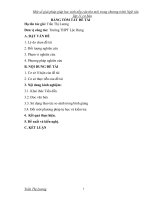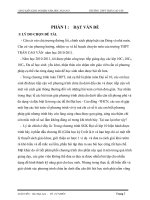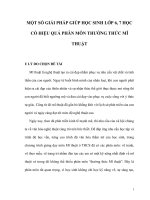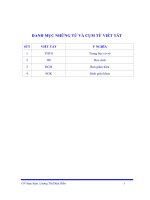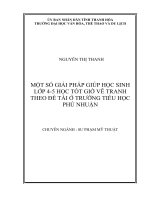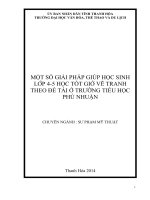Một số giải pháp giúp học sinh lớp 3 ghi nhớ từ vựng, mẫu câu và duy trì hứng thú học tiếng anh
Bạn đang xem bản rút gọn của tài liệu. Xem và tải ngay bản đầy đủ của tài liệu tại đây (141.92 KB, 18 trang )
THANH HOA EDUCATION AND TRAINING DEPARTMEMT
BA THUOC EDUCATION AND TRAINING DIVISION
EXPERIENCE INITIATIVE
TO HELP GRADE 3rd STUDENTS REMEMBER
VOCABULARY, MODELSENTENCES AND MAINTAIN THE
INTEREST IN LẺANING ENGLISH
Full name
: Le Thi Trang
Position
: Teacher
Subject
: English
School
: Dien Quang I Primary School
Ba Thuoc District – Thanh Hoa Province
1
CATEGORY
Page
Part I: Introduction
3
I. Reasons for choosing topic
3
II. Research purpose
3
III. Object and scope of research
4
IV. Research methods
4
Part II: Content
5
I. Rationale
II. Current situation of teaching and learning English at grade 3
in Dien Quang I primary school
5
III. Some solutions to help 3rd grade students
acquaint and memorize the vocabulary, model sentences
and maintain the interest in learning English
7
1. Helping students become familiar with the subject
7
2. Teaching and learning English vocabulary in 3rd grade
9
3. Teaching and learning grade 3 English sentence patterns
13
IV. Result
13
Part III. Conclusions and recommendations
15
I. Conclusion
15
II. Recommendation
15
•
•
•
Reference
The evaluated Initiative
17
18
PART I. INTRODUCTION
2
I. REASONS FOR CHOOSING THEMES
Today, English is one of the most important and essential subjects that are
introduced into schools in Vietnam. This course not only provides students with
knowledge of foreign languages but also a very necessary item for them to come to
life. In the economic integration period, English has become a tool to connect the
development of nations together. In particular, Vietnam is striving to make English a
second language in the future. Therefore, teaching and learning English for future
generations of the country is becoming an urgent need to help the country of Vietnam
integrate with other countries in the world.
In recent years, the Party and the State have paid close attention to stepping
up the effectiveness of teaching and learning foreign languages in schools, Dien
Quang I Primary School has also implemented many solutions to improve teaching
and learning English quality in school. However, this subject has not yet received real
attention from students as well as parents. They still think that this is a difficult subject
and they are afraid of studying this subject. The cause of the above situation is mainly
because the children do not know how to study this new subject, they are still
confused and do not know what to learn and how to learn in every English hour,
which part needs to study first, Which part is important
In order to help grade 3 students learn this subject effectively, requiring each
teacher to recognize, and understand the importance of teaching English to 3rd grade
students. Because they are so immature, their awareness is limited, besides that this is
a new subject for them to learn. Therefore teachers must know how to choose skills
that are appropriate to the level of awareness of students, especially students of 3rd
grade. That's why I choose the topic "Some solutions to help 3rd graders remember
vocabulary, sentence patterns and maintain interest in learning English ”, with the
desire to contribute a small part in creating a solid foundation for students to go to 4th,
5th and later levels.
II. RESEARCH PURPOSES :
3
- Finding appropriate teaching methods to help students quickly become familiar with
the subject and how to learn English, arousing creative thinking of children, giving
them inspiration in learning. Help them to formulate their love for the subject,
understand the words they are learning to be more active in communication. Thereby
educating the children the importance of the subject and building a serious sense of
learning for them in this subject.
- Encouraging teachers to work and find appropriate teaching methods for each unit of
lessons
III. OBJECT AND SCOPE OF THE STUDY :
To help grade 3rd students in Dien Quang Primary School know how tolearn
English successfully I study the following topics:
+) Methods to help students get acquainted and study English well.
+) Methods to help students memorize vocabulary.
+) Methods to help students memorize sentence patterns.
IV. RESEARCH METHOD
1. Observation method.
2. Experimental method.
3. Practical survey method.
4. Statistical method
PART II. CONTENT
4
I. THEORETICAL BASIS:
Through teaching practice, I realized that achieving the knowledge of English
subject of students in general and the 3rd grade students in Dien Quang I primary
school in particular is still very difficult and limited. Because this is a very new
subject for 3rd graders, the first time they get acquainted so they feel very surprised.
Children who do not know how to learn or do not have the appropriate method to
study this subject!
Moreover, with the skill level of the 3rd grade students, the ability to take note
lessons to study at home is very difficult because the class time is only 35-40
minutes /lesson is not enough for the students to copy all the necessary content and
knowledge or if they could do that, they could not remember the pronunciation, the
usage of each words and sentences. These restrictions require teachers to have
appropriate methods to help them be able to read words and sample sentences in the
right way in the classroom, when going home, they can revise themselves anytime and
anywhere.
II. CURRENT SITUATION OF TEACHING AND LEARNING ENGLISH AT
GRADE 3 IN DIEN QUANG I PRIMARY SCHOOL
In the 2013-2014 academic year, English is taught officially at Dien Quang I.
Primary School. Over the years, I realize that most of the students are really eager to
look forward to learning this new subject. However, through learning time, they lose
interest, feel shy and even afraid of learning English. Many people think that it is too
difficult, they are not able to or do not have the ability to learn languages
In the 2018-2019 school year, Dien Quang I Primary School has two grades 3
with 62 students, the duration of studying English was 2 periods per week. With the
above study duration after a period of study when the research method has not been
applied, the survey results in November 2018 are as follows:
5
Clas
s
Number
of
students
Number of
Number of
students
students
really
like
enjoyed
learning
learning
3A
3B
Total
31
31
62
2
1
3
6%
3%
5%
6
4
10
19%
13%
16%
Number of
Number of
sts dislike
sts afraid of
learning
learning
English
English
14
17
31
46%
55%
50%
9
9
18
Notes
29%
29%
29%
With the above mentioned fact, I boldly apply a number of new methods in
teaching and learning English for students this school year. During the implementation
process, I found the following advantages and disadvantages:
1. Advantages:
- Most of them are good students, obedient to teachers and parents
- Some families have been interested in learning English, buying necessary books,
school supplies for English so that they can learn and get familiar with the subject
- The school always tries to create the most favorable facilities for studying and
teaching this subject
- Government and organizations have been interested in promoting teaching and
learning English in primary schools.
2. Disadvantages :
2.1. Teachers and the school:
- English teachers themselves are still not actively communicating in English with
students. Because the number of students in a class is about from 30 to 35 , the time to
communicate between the Teachers and the students, between students and students is
not much.
- Facilities (radio, speakers, language classrooms ...) for teaching and learning English
are limited and needy
2.2. The students :
6
- For students in mountainous areas, English is still really strange, they can only hear
and know what English is when they come in and start studying in the 3rd grade.They
have appropriate lẻaning methods or don't even know how to learn how to memorize
words and memorize sentences.
- Most students are not aware of the importance of the subject. It is not considered a
necessary and important subject for their lives.
- Many children come from families with difficult circumstances, low living standard,
They live far-away from parents who are less interested in or even abandon their
children's education.
- Besides, the different level of awareness of each student is also a big difficulty for
teachers when the duration of each lesson is only 35-40 minutes.
- The number of students in each class is relatively large, affecting the progress of
their lessons.
- The lack of a communication environment is also a major obstacle to teaching and
learning foreign language
3. Causes :
- Propaganda about the importance of the subject is not much and has not reached all
parents.
- There are no extracurricular activities, creating an English playground for students in
the school.
- There is no link between learning English and other subjects (Arts, Music) to create
excitement for students.
- Landscape and environment in schools do not have much support for studying
English.
III. SOME SOLUTIONS TO TO HELP GRADE 3RD STUDENTS ACQUAINT AND
MEMORIZE THE VOCABULARY, MODEL SENTENCES AND MAINTAIN THE
INTEREST IN LEARNING ENGLISH :
1. Helping students become familiar with English:
7
For any subject, the first period is also "getting used to the subject". This is
the same to English, this is considered a preparation step in the mind to help students
initially have the simplest awareness about the subject, thereby helping them to be less
confused when starting to officially learn English and forming. give them love to
study the subject. Avoiding forced learning in a forced, cumbersome way. These only
make you feel less interested, discouraged by learning English. In this familiar lesson,
teachers need to clarify the following two issues:
1.1 Basic differences between Vietnamese and English:
The most obvious difference compared to Vietnamese is that English has the
letters W, F, Z. Knowing this helps them to avoid the surprise when writing and
recognizing words. Teachers also need to introduce both uppercase and lowercase
letters to students
For Vietnamese, it is possible to spell each word according to the rules and
then pronounce it into words. As for English, there are no spelling rules that students
will have to memorize and imitate the way teachers read.
In addition, there are many different points of phonetics, intonation, accents ...
requiring teachers to know and show them in the learning process, so that they have
the best view and feel about the language you are learning, avoiding bad errors or
even shocking due to differences in your mother tongue
1.2 Difficulties the students often encounter when they start learning English:
Most students when learning English will find it difficult or even impossible
to catch some sounds in English, such as /s/ in it's, he's, is ... /k/ in the words : look,
like, or /p/, /t∫/ ... This requires teachers to carefully guide, even check and guide each
student, avoid embarrassment and lack of confidence in the students when they
pronounce.
They can't remember how to read and the meaning of words or even in class,
remember to come home then forget. This situation can easily lead to pessimistic
8
depression for children in learning English. Teachers should have appropriate methods
of psychological preparation for them and have a solution when the situation occurs.
Not only for students but for anyone who learns English when facing
difficulties, teachers need to have timely help and encouragement so that they always
feel excited about the subject.
2. Teaching and learning English vocabulary in 3rd grade:
In an English lesson, most lessons have a section "Introducing vocabulary". In
order to achieve high results, students must remember the pronunciation and usage of
the words. In that way, teachers need to choose skills that are suitable for each word so
that students are easy to understand, remember and use. Through the teaching process
and reference, I would like to present some common methods of teaching and learning
English vocabulary that I find students interested in learning, remembering and
memorizing for a long time:
2.1. Learning words through songs / chant songs.
In the distribution of the English language program for 2 periods per week, it
is not compulsory for teachers to teach this part, but learning words through songs /
chants is highly interesting to students. Students have been re-educated and
entertained through music. This way helps students remember words easily and for a
long time so teachers should find ways to choose and integrate appropriately:
EX:
* Song: "Sing a rainbow", students will keep in mind the words that show colors at
Unit 9
* Song: "Toys, toys, toys, toys", students will remember the words for toys in Unit 17
* Song: "Finger family", students will remember the words of family members at Unit
11.
* Song: "two kind doctors", students will memorize the words of career
……….
2.2. Learning by logic starting from the last letter of the previous word.
9
This method helps students remember the words they have learned before.
This helps students systematize the vocabulary they have learned at all topics. This
way of learning can be done in the revision period, at the beginning or the end of each
lesson:
EX:
book - kite - eye - ear - rabbit - two - orange - eleven, ..............
2.3. Studying by topic.
This method helps students systemize the words they have learned by each topic,
thereby helping students to try and remember deeper and stronger words.
EX:
* Topic 1: colors: red, blue, pink, white .........
* Topic 2: animals: dog, cat, bird, rabbit, lion ........
* Topic 3: toys: kite, ball, doll, teddy bear, .....................
* 4: Topic job: nurse, fireman, doctor, pilot ...................
……………………… ..
2.4. Learning words by alphabet:
This method helps students remember words very easily and more deeply
based on the initial letters.
EX:
* Letter A: apple, arm, aunt, are, .............
* Letter B: bird, box, big, blue, black, ...........
* Letter C: cat, car, cook, can, .............
* Letter D: dog, do, door, dad, ...........
* Letter F: finger, four, five, face, ..................
2.5. Given the words from the root
When any teacher or student makes an original word then the teacher asks
students to develop the word into new meaningful words. With this method helps
10
students develop thinking skills and develop from the root. From there students get a
more basic vocabulary.
EX: Teach (teach) - teacher: (teacher)
Drive (driver) - Driver (driver)
Work - Worker - factory worker Play (play) - player (player) - football player 2.6. Learning words at anytime and anywhere:
This method helps students get rich words and is very practical:
* At school: class, school, book, pupil, teacher, classmate ……
* At home: dad, mum, brother, sister, grandma, grandpa ………………
* At the party: cake, flower, ice-cream, friend, candy, candle ...........
2.7. Regularly study
Encourage students to spend a little bit of time about 20-30 minutes to learn
words every day rather than spend more time studying in a day and sometimes learn.
In this way, students can review many times in certain words, thereby helping them
remember longer.
2.8. Asking each student to have a notebook to take note words
Every student needs to have a notebook from every day, every word they can
write 10-15 times. Teachers can periodically take a grade to encourage taking
additional points for oral examination or 15-minute test scores. In this way students
can practice words more often and remember longer.
2.9. Writing the word into a small piece of paper.
In addition to writing words into notebooks, students can use small pieces of
paper and write words in and paste them around their room or home. In this way
students save a lot of time, students can both learn and do it smoothly.
2.10. Draw pictures.
Teachers can guide students to draw pictures that are simple, so that they can
remember longer. They can both draw and learn, through which students can engrave
11
the word longer. With this way, students are very easy to learn and very easy to
remember the word that they have just learned.
EX:
2.11. Use real objects.
Teachers can guide students to use objects around them. When students learn
a word related to real things around our lives, teachers should guide students study at
home
Looking at those things will help to remind the words they have leaened. With
this method, students can understand and remember words longer, and when they
forget they can recall those words by looking at the things they have used before.
EX:
a table
a bed
a window
2.12. Giving antonyms
The teacher can make either a student in the study group give a word or group of
words and ask the other students to give the opposite word the word. With this method
helps students recall the words they have learned before, through which students can
inculcate and recall the word again.
EX: black> <white far>
In every English lesson, almost every lesson has a "sample sentence" section. In order
for students to understand and flexibly use these sentence patterns, teachers need to
12
select skills that are appropriate for each type of sentence pattern for each student, so
that students are easy to remember and use. Through the teaching and reference
process, I would like to offer some methods to teach and train students to memorize
common English sentence patterns that I find students interested in learning:
3.1. Teach sentence patterns through regular communication:
+) Every day entering the classroom, teachers should take 3 to 5 minutes of
communication with at least 3 students by asking them common questions they have
learned such as:
- How are you?
- How old are you?
- What’s your name?
.......................
Over time the number of questions increases. Initially the teacher should talk to the
good students, and then talk to all the students in the class. This is a good habit and
very effective in helping students memorize sentence patterns.
3.2. Teach sentence patterns through games:
+) Guide students to play "Simon says" with the structure "I have a .........."
+) Have students play "Guessing games" with the structure "What color is it?
3.3. Teaching sentence patterns through songs:
+) Teach students "open the book" with structure "What’s it?
IV. RESULT :
After applying some methods of teaching and learning English 3 above, I obtained
some results as follows:
1. Students:
Most of them keep their initial interest, actively participate in learning activities. The
children were more confident in communication, confidently greeted in English with
the teachers in the school and said some simple sentences. Every lesson for students
really becomes more rewarding and meaningful. They boldly exchanged with each
13
other in English during lessons and listening comprehension of teachers' simple
instructions and requirements. The following is the specific result I obtained after
applying this research topic at the end of March 2019:
Clas
s
Number
of
students
Number of
Number of
students
students
really
like
enjoyed
learning
learning
3A
3B
Total
31
31
62
5
4
9
16%
13%
15%
17
15
32
55%
48%
51%
Number of
Number of
sts dislike
sts afraid of
learning
learning
English
English
9
12
21
29%
39%
34%
0
0
0
Notes
0
0
0
2. Teachers:
Feeling more confident, more interested in teaching, reduced some pressure
on student quality, overcome the inhibition in the classroom when only a few students
participated in the speech.
PART III: CONCLUSIONS AND RECOMMENDATIONS
14
I. CONCLUSION:
Activities in the topic are only a small part of the lesson, but They play an
important role, evoking the students' interest in learning. Over a period of experience,
I found that to have a successful lesson, teachers need not only have pedagogical skills
but also need do the following tasks well:
- Teachers have deep and extensive knowledge of their subjects
- Master the teaching methods
- Know how to care about her students
- Reasonable time distribution
- Preparing all conditions for lessons such as lesson plans, teaching aids, ....
- Preparing a good mind before going to class.
- Preparing students for a comfortable psychology before entering the lesson.
- Creating a learning atmosphere that is comfortable and joyful to inspire learning
interest and be unique to students
II. RECOMMENDATION :
When I tested this topic, my students and I faced some difficulties, which
made the project's level of success not high. So I have proposed to the school and all
management some of the following issues:
1. For management :
Providing each school with at least one portable loudspeaker that can move
among classrooms or arrange a dedicated language study room for students to have
the opportunity to hear their voices and catch pre-phonetic intonation Native is the
most accurate way
2. For the School:
15
Building learning spaces, English learning corners at the library as well as classes to
improve the sense of learning English as well as creating English learning
environment for children.
Need to actively propagate to parents, so that they pay more attention to their
children's learning. Raise awareness of parents as well as students about the
importance of the subject.
Strengthen extracurricular activities with the participation of English subjects to create
more opportunities for exchange for students.
Above is the whole content of the research that I study, I hope this topic will
help teachers can apply part of their lesson.
I would like to thank you!
Ba Thuoc, April 2, 2019
The writer of the initiative
Le Thi Trang
EVALUATION OF THE COUNCIL
…………………………………………………………………………………………
…………………………………………………………………………………………
…………………………………………………………………………………………
…………………………………………………………………………………………
…………………………………………………………………………………………
………………………………………………
REFERENCES
16
1.
2.
3.
4.
5.
6.
New ways in teaching Grammar
Martha C. Pennington
Five minutes activities
Andrew Wright
Teach English
Adrian Doff
Teaching Grammar and Vocabulary
HongDuc university
A methodology course for English
Language teacher
HongDuc university
Link /> /> />
CATEGORY
EXPERIENCE INITIATIVES WERE EVALUTED FROM C UP BY THE
DISTRICT EDUCATION AND TRAINING COUNCIL
17
Full name: Le Thi Trang
School : Dien Quang I Primary School
Ite
m
Names of the initiative
1.
Một số thủ thuật giúp kiểm
tra và ôn tập từ vựng hiệu
quả trong dạy học tiếng Anh
lớp 6,7 trường THCS
Giúp học sinh rèn luyện kỹ
năng trả lời câu hỏi trong dạy
học tiếng Anh lớp 6,7 trường
THCS
The Techniques should be
used in teaching the language
Focus lessons in English 8
2.
3.
Level Rating
(Education
branch at district
/ province )
Result
(A, B,or C)
School year
District
C
2011-2012
District
C
2012-2013
District
C
2016-2017
18
